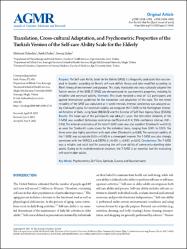Translation, Cross-cultural Adaptation, and Psychometric Properties of the Turkish Version of the Self-care Ability Scale for the Elderly
Abstract
Purpose: The Self-care Ability Scale for the Elderly (SASE) is a frequently used scale that was created
in Sweden according to Orem’s self-care deficit theory and later modified according to
Pörn’s theory of environment and purpose. This study translated and cross-culturally adapted the
Turkish version of the SASE (T-SASE) and demonstrated its psychometric properties, including its
reliability and construct validity. Methods: This study recruited a total of 122 participants and
applied international guidelines for the translation and adaptation of the scale. The test-retest
reliability of the SASE was calculated at 1-week intervals. Internal consistency was analyzed using
Cronbach’s alpha. For construct validity, we compared the T-SASE to the Nottingham Extended
Activities of Daily Living Scale (NEADLS) and the Exercise of Self-Care Agency Scale (ESCAS).
Results: The mean age of the participants was 68.6±5.7 years. The test-retest reliability of the
T-SASE was excellent (intraclass correlation coefficient=0.914; 95% confidence interval, 0.81–
0.95). The internal consistency of the total T-SASE score was also excellent (Cronbach’s α=0.912),
as were the Cronbach’s alpha scores for the individual items, ranging from 0.901 to 0.915. The
items were also highly consistent with each other (Cronbach’s α>0.80). The construct validity of
the T-SASE was acceptable (0.35<r<0.50) in a convergent manner. The T-SASE was also strongly
correlated with the NEADLS and ESCAS (r1=0.405, r2=0.437, p<0.01). Conclusions: The T-SASE
was a reliable and valid tool for assessing the self-care ability of community-dwelling older
adults. Owing to its multidimensional structure, the T-SASE is an essential tool for evaluating
self-care in older adults.


















